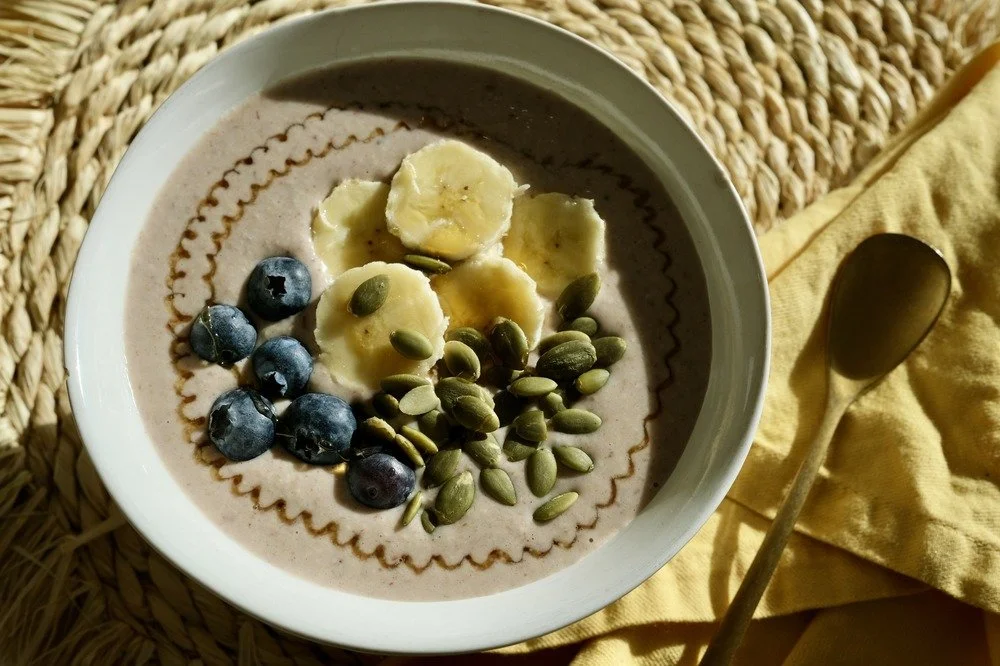Gut Health 101: A Complete Guide Improving Digestion Through Nutrition
Your gut is more than a digestive machine — it’s home to trillions of bacteria, fungi, and other microorganisms that influence nearly every system in your body. From the way you absorb nutrients to your immune defenses, mental health, and hormone balance, gut health is deeply intertwined with your overall wellness.
In this guide, we’ll explore how your gut works, what it looks like when it’s out of balance, and — most importantly — the daily steps you can take to improve it. You’ll also find gut-friendly recipes and links to more in-depth articles so you can dive deeper into specific topics.
The Basics
The Gut Microbiome 101
Your gut isn’t just a tool for processing food — it’s a highly active ecosystem. Inside your digestive tract live trillions of microorganisms, collectively called the gut microbiome. These bacteria, fungi, and other microbes work alongside your own cells to break down food, absorb nutrients, and perform hundreds of functions you can’t see or feel in the moment.
When your microbiome is in balance, these microbes:
Aid digestion and nutrient absorption
Help produce vitamins like B12 and K
Support your immune system
Regulate inflammation
Influence mood and mental health through the gut-brain axis
When balance is lost, harmful bacteria can overgrow, inflammation can spark, and you may notice changes in digestion, energy, mood, and even skin health.
The Gut as a Whole-Body System
The gut plays roles far beyond digestion:
Immune Function: Roughly 70% of your immune system resides in your gut, meaning its health directly impacts your ability to fight off illness.
Hormone Regulation: Certain gut bacteria metabolize hormones, influencing estrogen balance, cortisol responses, and more.
Neurological Health: The gut communicates constantly with the brain, producing neurotransmitters like serotonin that affect mood and sleep.
Metabolism: A healthy microbiome helps regulate weight and blood sugar.
Factors That Influence Gut Health
Your microbiome is shaped by many factors over your lifetime, including:
Diet Quality & Diversity: A varied, plant-rich diet encourages microbial diversity, while processed foods can reduce it.
Stress Levels: Chronic stress disrupts gut bacteria and weakens the intestinal barrier.
Sleep Quality – Poor sleep can alter microbiome composition in just days.
Medications – Antibiotics, acid blockers, and NSAIDs can disrupt microbial balance.
Lifestyle & Environment – Sedentary habits, low sun exposure, and even pollution can influence gut health.
Signs of an Unhealthy Gut
Gut imbalances can show up in ways you might not expect:
Digestive symptoms like bloating, gas, diarrhea, or constipation
Frequent illness or slow recovery from sickness
Fatigue or brain fog
Skin issues like acne, eczema, or rashes
Increased food sensitivities or intolerances
Even mild or occasional symptoms can be a sign your gut needs attention.
Related Post: Seven Surprising Signs of an Unhealthy Gut
Common Gut Health Myths
| Myth | The Truth |
|---|---|
| You need expensive probiotic supplements to have a healthy gut. | While supplements can help, whole and fermented foods — like yogurt, kefir, sauerkraut, and kimchi — can be just as effective for many people. |
| All bacteria are harmful. | Many bacteria are essential to your health, helping with digestion, nutrient production, and immune system training. |
| Digestive symptoms are always caused by food. | While diet matters, stress, sleep quality, and certain medications can also play a big role in gut health. |
4 Practical Steps to Improve Gut Health
Improving your gut health isn’t about a quick fix — it’s about creating an environment where beneficial bacteria can thrive long-term. While supplements can be helpful, the most powerful shifts come from your daily diet and lifestyle.
Below are four easy steps you can start today to improve microbial diversity, strengthen your digestive system, and reduce inflammation — all of which contribute to better digestion, energy, mood, and immunity.
1. Eat a Diverse, Plant-Rich Diet
Aim for 20–30 different plant foods per week to feed a wide range of beneficial bacteria. This includes vegetables, fruits, herbs, legumes, whole grains, nuts, and seeds. The more variety, the more resilient your microbiome becomes.
Related Post: The Five Most Important Nutrients for Gut Health
Some of my favorite examples:
| Food | Key Nutrient | Gut Health Benefit |
|---|---|---|
| Kefir | Probiotics | Restores microbial balance and supports digestion |
| Garlic | Prebiotic Fiber | Feeds beneficial bacteria and promotes diversity |
| Salmon | Omega-3 Fatty Acids | Reduces gut inflammation and supports a healthy microbiome |
| Sweet Potatoes | Fiber + Polyphenols | Supports digestion and encourages beneficial bacteria growth |
| Sauerkraut | Probiotics | Boosts immunity and improves digestive function |
2. Feed and Replenish Your Gut Bacteria
Your gut thrives when you give it both the beneficial bacteria it needs (probiotics) and the fibers those bacteria feed on (prebiotics).
Probiotics are live bacteria that help restore balance to your microbiome. You can get them from fermented foods like yogurt, kefir, sauerkraut, kimchi, miso, and tempeh. Rotating these foods gives you exposure to different bacterial strains.
Prebiotics are fibers that pass undigested into the colon, where they feed your good bacteria and help them multiply. Great sources include garlic, onions, asparagus, leeks, green bananas, and oats.
Tip: Pair them together — for example, top your yogurt (probiotic) with oats and berries (prebiotic), or serve kimchi (probiotic) alongside a fiber-rich veggie stir-fry (prebiotic).
Learn More: Diet and Your Gut: What Do Probiotics and Prebiotics Do?
3. Limit Ultra-Processed Foods and Excess Sugar
Refined carbs, added sugars, artificial sweeteners, and trans fats can disrupt your microbiome and encourage the growth of harmful bacteria. Processed foods often lack the fiber, antioxidants, and nutrients your gut needs to function optimally.
For a deeper dive into which foods are the most harmful to your digestive health — and what to eat instead — check out my guide: The Five Worst Foods for Gut Health.
Small swaps can make a big difference: trade sugary breakfast cereals for oats with fruit, replace soda with sparkling water, and choose whole, minimally processed ingredients whenever possible.
4. Support Your Gut Through Healthy Daily Habits
Your lifestyle plays a major role in shaping your gut health — sometimes just as much as your diet.
Stay Hydrated: Water keeps digestion moving, supports nutrient absorption, and helps maintain a healthy balance of gut bacteria. Herbal teas like peppermint, ginger, or chamomile can be soothing for digestion.
Manage Stress: Chronic stress can alter your microbiome and weaken the gut lining. Incorporating mindfulness, meditation, deep breathing, or simply spending time outdoors can help restore balance.
Prioritize Sleep & Movement: Poor sleep can shift microbiome diversity in a matter of days, while regular exercise helps increase microbial diversity and supports digestion. Aim for 7–9 hours of sleep and at least 20–30 minutes of movement most days.
For more ways to create a foundation of good health that supports your gut — and your whole body — read my post: 17 Holistic Habits to Improve Your Daily Health.
Explore My Gut Healthy Recipes
How Your Gut Effects Your Whole Body
The Gut-Hormone Connection
Your gut and your hormones are more closely linked than most people realize. Certain gut bacteria, known collectively as the estrobolome, help metabolize and regulate estrogen. When these bacteria are out of balance, estrogen levels can spike or drop too low, potentially contributing to PMS, irregular cycles, perimenopausal symptoms, and fertility challenges.
But estrogen isn’t the only hormone your gut influences. A healthy microbiome also supports:
Cortisol regulation: Gut inflammation can elevate stress hormones, making it harder to manage daily stress.
Insulin sensitivity: Balanced gut bacteria can improve how your body uses blood sugar, helping to prevent energy crashes.
Thyroid health: Nutrient absorption in the gut affects thyroid hormone production.
Supporting your gut through nutrient-dense foods, probiotics, and stress management can directly improve hormonal balance — and the symptoms tied to it.
Related Guide: How to Increase Estrobolome: Supporting Your Gut-Hormone Connection
The Gut-Brain Axis
Your gut and brain communicate constantly through a network of nerve pathways, chemical messengers, and immune signals. This gut-brain axis is one of the reasons why what you eat can affect how you feel emotionally — and why stress can impact your digestion.
Key points to know:
Serotonin production: Roughly 90% of serotonin, a neurotransmitter that affects mood, sleep, and digestion, is made in the gut.
Stress response: Gut bacteria influence how your body and mind respond to stress, affecting both resilience and recovery.
Cognitive health — An inflamed or imbalanced gut may contribute to brain fog, difficulty focusing, or mood instability.
Feeding your microbiome with diverse, plant-rich foods and fermented foods can support both mental clarity and emotional stability.
Related Guide: The Gut-Brain Axis: Using Diet to Improve Mental Health
Gut and Immune Function
About 70% of your immune system resides in your gut. The bacteria lining your intestines act as gatekeepers, helping your body distinguish between safe substances and harmful invaders.
When your microbiome is balanced:
Your immune system is better equipped to fight off infections.
Inflammation is kept in check.
Recovery from illness can be faster.
On the other hand, an imbalanced gut can contribute to chronic inflammation, allergies, or recurring illnesses. Supporting gut health is one of the most effective ways to keep your immune system strong year-round.
Related Post: Signs of a Strong Immune System — And Tips to Support It
Further Reading & Resources
Ready to Take the Next Step?
3-Month Digestive Health Program
A painful gut is NOT normal. Understanding your gut microbiome and how your digestive system works is a crucial part of your overall health. With further gut testing and a detailed analysis of your current diet, I will begin educating you on how the foods you put into your body have a cascading effect on your general wellbeing and provide transformative diet and lifestyle strategies to support proper digestion. Experience lasting relief from symptoms such as bloating, IBS, SIBO and more.
If you’re ready for a personalized plan to restore balance, schedule a consultation today.











































